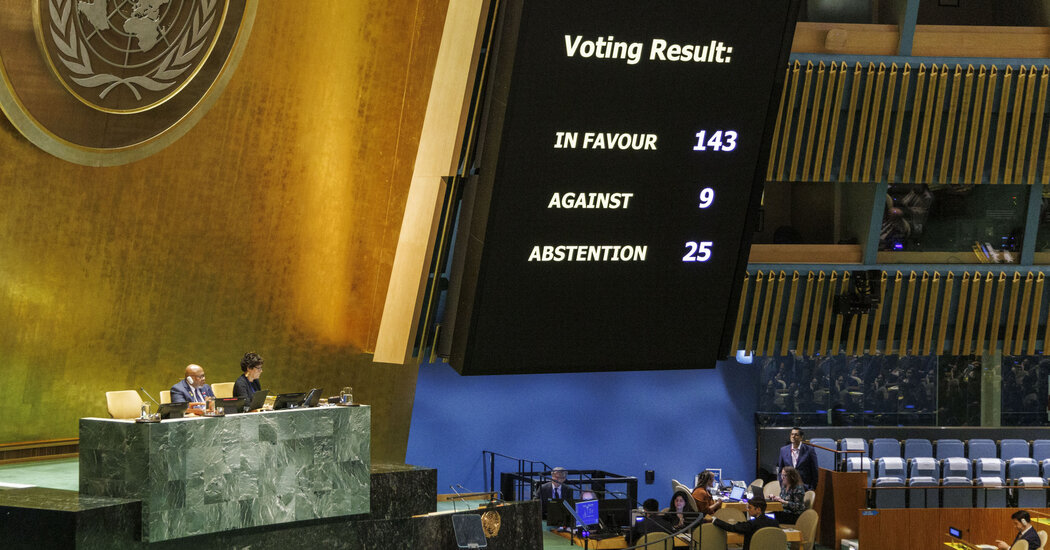
The United Nations General Assembly on Friday overwhelmingly adopted a resolution declaring that Palestinians are entitled to the status of full members of the United Nations, a highly symbolic move that reflects growing global solidarity with the Palestinians and represents a rebuke to Israel and the United States.
The resolution was approved with 143 votes in favour, 9 against and 25 abstentions. After the vote the Assembly burst into great applause.
But the resolution does not mean that a Palestinian state will be recognized and admitted to the United Nations as a full member any time soon. The Assembly can only grant full membership with Security Council approval, and if history is any guide, the United States would almost inevitably exercise its veto power to eliminate such a measure, as it did in April.
Although a majority of the General Assembly has long supported Palestinian statehood, the resolution was the first time the body voted on the issue of full membership. The resolution declares that “the State of Palestine is qualified to become a member of the United Nations” according to the rules of its Charter and recommends that the Security Council reconsider the matter with a favorable outcome.
The resolution was prepared by the United Arab Emirates, the current chair of the United Nations Arab Group, and sponsored by 70 countries. The United States voted no, along with Hungary, Argentina, Papua New Guinea, Micronesia and Nauru.
“The vast majority of countries in this room are fully aware of the legitimacy of the Palestinian candidacy and the rightness of their cause, which faces ferocious attempts to suppress it and render it meaningless today,” said UAE Ambassador Mohamed Abushahab, as he presented the resolution on behalf of the Arab group.
While largely symbolic, the resolution provides the Palestinians with new diplomatic privileges. Palestinians can now sit among member states in alphabetical order; they can speak at General Assembly meetings on any topic instead of limiting themselves to Palestinian affairs; they can present proposals and amendments; and may participate in United Nations conferences and international meetings organized by the Assembly and other United Nations bodies.
The 193-member General Assembly addressed the issue of Palestinian membership after the United States vetoed a resolution before the Security Council in April that would have recognized full membership in a Palestinian state. While the majority of council members supported the initiative, the United States argued that recognition of Palestinian statehood should be achieved through negotiations between Israelis and Palestinians.
Frustration with the United States has simmered for months among many senior UN officials and diplomats, including those from allies such as France, as Washington has repeatedly blocked ceasefire resolutions at the Security Council and has staunchly supported the war Israel against Hamas in Gaza, even as civilian suffering escalated.
“The United States is resigned to having another bad day at the United Nations,” said Richard Gowan, a United Nations expert for the International Crisis Group, a conflict prevention organization. But he added that the resolution “gives the Palestinians a boost without creating a rift over whether or not they are members of the United Nations.”
Riyad Mansour, the Palestinian ambassador to the United Nations, told the Assembly before the vote that the Palestinians' right to full membership of the United Nations and statehood “are not the subject of negotiations, they are our inherent rights as Palestinians.” He added that a vote against Palestinian statehood is a vote against the two-state solution.
Israel's ambassador to the United Nations, Gilad Erdan, a harsh critic of the United Nations, said that voting for a Palestinian state would mean inviting “a state of terror” into its midst and rewarding “terrorists” who killed civilians with privileges Jews and called on Member States to support and “hate Jews”.
Robert A. Wood, U.S. ambassador to the United Nations, said that while the United States supports the two-state solution as the only means to sustainable peace, “it remains the U.S. view that unilateral measures at the United Nations and on the ground do not will advance this goal.”
Wood said that if the Assembly referred the matter back to the Council, it would again have the same result with the US blocking the move.
The Palestinians are currently recognized by the United Nations as a non-member observer state, a status granted to them in 2012 by the General Assembly. They do not have the right to vote on General Assembly resolutions or nominate candidates to United Nations agencies.
France, a close US ally and one of the five permanent members of the Security Council, supported the Palestinian bid for statehood in breaking with the US position at the UN in both the Council and Assembly votes. “The time has come for the United Nations to act to resolve the Israeli-Palestinian conflict, based on the two-state solution,” Nicolas de Rivière, France's ambassador to the UN, said on Friday. .
The Assembly session, scheduled for Monday due to the long list of speakers, was not without moments of performative drama.
Mr Erdan, Israel's ambassador, showed the photo of Hamas military leader Yahya Sinwar, considered the architect of the October 7 attacks on Israel, with the word “President”, and then a transparent paper shredder, placing inside a piece of paper and claimed that member states are “destroying the Charter of the United Nations”.
Mr. Mansour, the Palestinian ambassador, raised his fist in the air at the end of his speech, visibly holding back tears, and said “Free Palestine.” The Assembly burst into applause.
